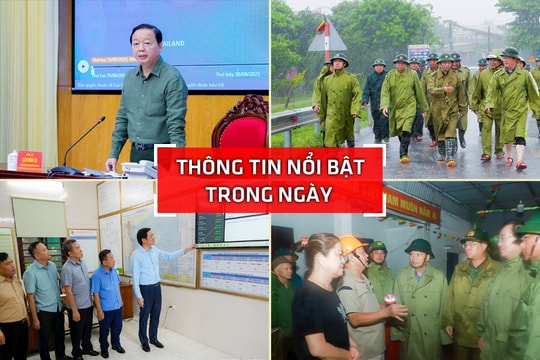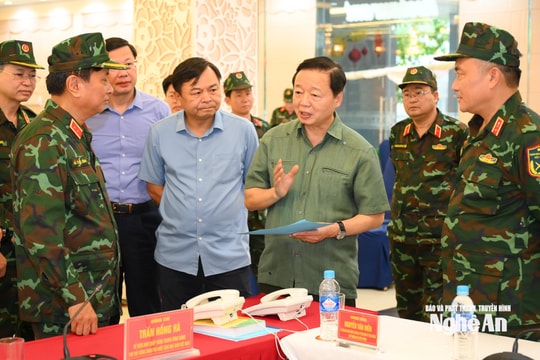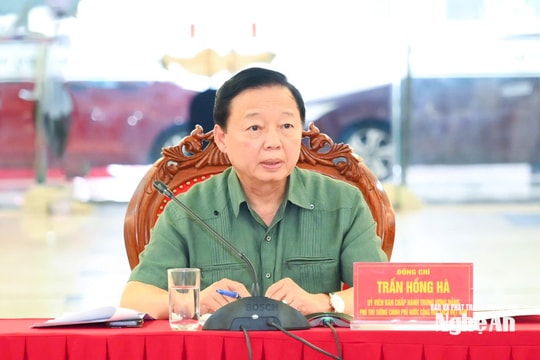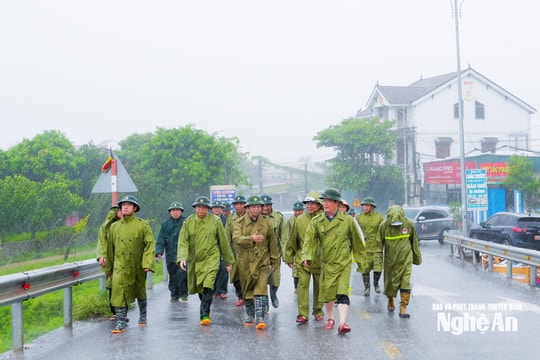New Minister of Natural Resources and Environment: Solving pressing issues is not just about words
“Personally, I am always deeply aware that the people always want Ministers to be close to the people, understand the people, respect the people and take strong, decisive actions, dare to think, dare to do, dare to take responsibility; words must go hand in hand with actions to solve pressing problems arising in real life.
This is the heartfelt sharing of Minister of Natural Resources and Environment Tran Hong Ha with reporters of the Government Portal right after he was approved by the National Assembly to hold the position of Minister of Natural Resources and Environment.
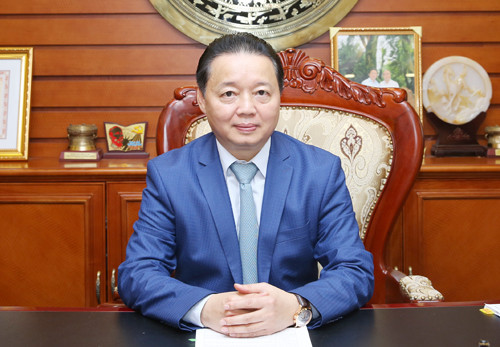 |
| New Minister of Natural Resources and Environment Tran Hong Ha. |
Minister Tran Hong Ha also affirmed: "Personally, I will try my best to not disappoint the people's trust, and at the same time fulfill the heavy tasks that our Party and State require of me."
PV:So what are the key tasks of the Ministry of Natural Resources and Environment in the coming period, Minister?
Minister Tran Hong Ha:At present, issues such as proactively responding to climate change, resource management and environmental protection have set specific goals in the socio-economic development of the country in general and in the management of resources, environment and response to climate change by 2020 in particular. Solving the problem of managing and protecting resources and environment for sustainable development and socio-economic growth, the measure of the effectiveness of this direction and management is the positive change in reality, the contributions to national development, social stability, improving people's lives, and improving the living environment.
In that spirit, the Ministry of Natural Resources and Environment will organize and effectively implement the Party's Resolutions and the Government's action programs in perfecting institutions, policies and laws on natural resources, environment and climate change, in which it is necessary to harmoniously resolve the two tasks of promoting economic development and protecting natural resources and environment for sustainable development; resolutely join with ministries and local branches to resolve pressing issues related to natural resource management, environmental protection and climate change response arising in practice such as pollution, complaints, land waste, water resources and mineral issues.
Promote administrative reform, contribute to creating a favorable business and investment environment, ensure publicity and transparency, create favorable conditions for economic sectors to access natural resources, thereby creating more impetus for the country's socio-economic development; promote the coordination and unified management role of the Ministry and the Ministry of Natural Resources and Environment in responding to climate change, resource management and environmental protection. Because the issues that the Ministry of Natural Resources and Environment manages and coordinates are sensitive, complex, and closely related to many other sectors and fields; expand international cooperation on natural resources, environment and climate change response to take advantage of financial and technological support opportunities from multilateral and bilateral cooperation activities to contribute to solving current pressing challenges.
Solving land policy and law issues well will create more motivation for economic development, contributing to social stability because this is an important field of the country, always a hot, sensitive, complicated issue related to all people and businesses; protecting, using water resources economically and effectively and enhancing cooperation in sharing water resources across countries. In fact, the drought situation in the Mekong Delta, Central region and Central Highlands under the impact of climate change shows that water security has become an important and urgent issue.
PV:As a direct participant in field surveys on the drought situation in the Central and Central Highlands regions and saline intrusion in the Mekong Delta, could you please tell us about solutions to these problems?
Minister Tran Hong Ha:We know that the internal water resources in Vietnam only account for about 37% (310-315 billion m3/year), the rest comes from outside the territory and the demand for water for life and production will increase rapidly. In this situation, the task is to protect, use water resources economically and effectively and strengthen cooperation in sharing water resources across countries.
The Ministry of Natural Resources and Environment will proactively and actively deploy comprehensive and synchronous solutions such as basic investigation of water resources; inventory of water resources; assessment, warning, and forecasting of the impact of climate change on water resources; implementation of the National Strategy on Water Resources to 2030, vision to 2050; development of water resources planning nationwide; planning of water resources for inter-provincial river basins and inter-provincial water sources, on that basis, review and adjust planning, rationally zoning production; exploit and use water resources economically and effectively, ensuring comprehensive and multi-purpose use. Control the reduction of groundwater and surface water. Protect water resources, overcome and limit pollution, degradation, and depletion of water resources; coordinate with ministries, branches, and international organizations to negotiate with relevant countries to build and perfect a mechanism for sharing and protecting transnational water resources...
PV: Vietnam has joined the United Nations Framework Convention on Climate Change (COP21), so what do we need to do to seize the opportunity, call for international support and effectively use this resource to proactively respond to climate change, Minister?
Minister Tran Hong Ha:It can be said that the recent COP21 Conference in Paris reached a historic agreement, demonstrating human responsibility to save the Earth from the impacts of climate change.
To implement the contents of the 2015 Paris Agreement in the coming period, we need to focus on a number of solutions such as: Clearly identifying the advantages and difficulties for Vietnam in the new development period, including the opportunities and challenges of responding to climate change when implementing the Paris Agreement; emphasizing the need to change the behavior and lifestyle of the whole society towards forming a sustainable production model and consumption habits, using resources economically and effectively, and at the same time forming for each member of society the awareness of proactively preventing and avoiding natural disasters, adapting to climate change, thereby gradually reducing damage to people and property.
Proactively review mechanisms and policies based on the contents of the Agreement, thereby amending, supplementing, and promulgating mechanisms and policies on climate change response, in accordance with new regulations formed on a global and regional scale in the future.
In addition, there are many other important solutions such as legalizing agreements that Vietnam has participated in, issuing preferential policies, supporting businesses to enhance the implementation of greenhouse gas emission reduction activities, promoting supervision by people and organizations, developing human resources, enhancing scientific research activities and developing appropriate technology to transform the growth model, promoting internal resources, and seeking international support to implement Vietnam's commitments...
In particular, seriously implementing Resolution No. 24-NQ/TW of the Party Central Committee on proactively responding to climate change, strengthening resource management and environmental protection. That is a solid foundation for us to believe in successfully taking advantage of the opportunities brought about by the 2015 Paris Agreement, contributing to sustainable socio-economic development.
PV:Thank you very much, Minister, for this interview!
According to Chinhphu.vn
| RELATED NEWS |
|---|

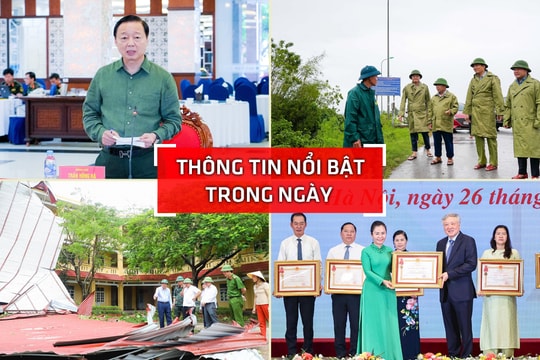
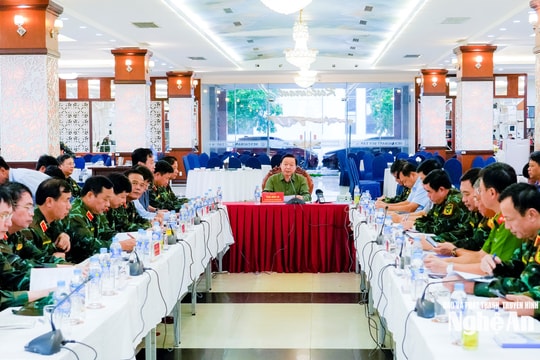
.jpg)
